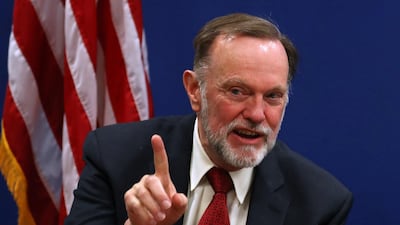Washington’s top envoy to Africa has warned of “spoilers” hoping to derail negotiations between Sudan’s Transitional Military Council and civilians on a transition to democratic rule.
US Assistant Secretary of State for African Affairs Tibor Nagy said although a power-sharing deal had been reached, other forces in Sudan would be intent on destroying it.
“There are still spoilers out there,” Mr Nagy told reporters in London on Monday. “So it's very important to focus on getting this process moving forward.”
He said there were potential spoilers on both sides, including supporters of the former regime of Omar Al Bashir, the president who was toppled by military in April after months of street protests against his rule.
“I don't have precise information on this group or that group or that individual, but suffice to say that there are fringe elements on both sides that are probably not happy with the positive process and the positive outcome,” he said.
“Some on one side would probably like to sneak back in the former regime and some on the other side would probably want to go off in a very radical direction.”
The veteran diplomat, who has served as ambassador to Ethiopia and Guinea and as deputy chief of mission in Nigeria, Cameroon and Togo, said the international community and those involved in the power-sharing deal would have to stay focused on a “transition to a civilian-led government which is acceptable to the Sudanese people”.
Mr Nagy was accompanied on a two-day trip to Sudan in mid-June by newly-appointed special envoy Don Booth, meeting with various parties to the political turmoil in the country, including the leader of the Transitional Military Council, General Abdel Fattah Al Burhan, representatives of the Forces for Change group, women’s groups and mediators from the African Union and Ethiopia.
On Friday, a power-sharing deal was reached, committing to a transitional period of just over three years with leadership switching between the military and a civilian representative. It included an agreement on an independent investigation into violent incidents after the fall of Mr Al Bashir.
The ambassador said the US supported an “independent and credible” investigation into who was behind the June 3 crackdown on demonstrators, which killed 61, according to the country’s health ministry. The Central Committee of Sudan Doctors puts the death toll much higher at 118. At least 40 bodies of those killed were later found in the Nile, the doctors said.
“In my discussions with General Burhan, I made absolutely clear the problems inherent with a government that investigates itself,” Mr Nagy said.
“It could be the most flawless investigation, but the credibility would be universally questioned.
“The Sudanese people have to find out who gave orders when, how, because in my own interviews with some of the victims, it seemed very obvious that the attack on civilians was a co-ordinated and planned event.”
Mr Nagy said the enduring success of the deal between the civilians and the military hinged mainly on breathing life into Sudan’s economy, decimated by 29 years of neglect and corruption under Mr Al Bashir.
Gulf states may provide cash injections on the proviso the transitional government roots out Al Bashir supporters.
Mr Nagy said there was no checklist to resume economic relations between the US and Sudan, but the first port of call would have to be removal of the country from the list of state sponsors of terrorism. Sudan was added to the list in 1993.
“There are a number of conditions that have to be met before that can even be considered to be lifted,” he said, adding that even after this, the US would at a minimum expect to see a civilian-led transition before looking at resuming negotiations with Sudan.
“On the other hand, once things take off in a positive direction, that would certainly be a signal to business communities, not just in the United States and in the West.
“And believe me, Sudan offers quite attractive options for traded investment, which is something which has also been a driving force for them to try to achieve an agreement because all the governments realise that the economic situation is dire,” he said.
“The last thing you want is sitting on an economic powder keg because that's what set it off in the first place.”


